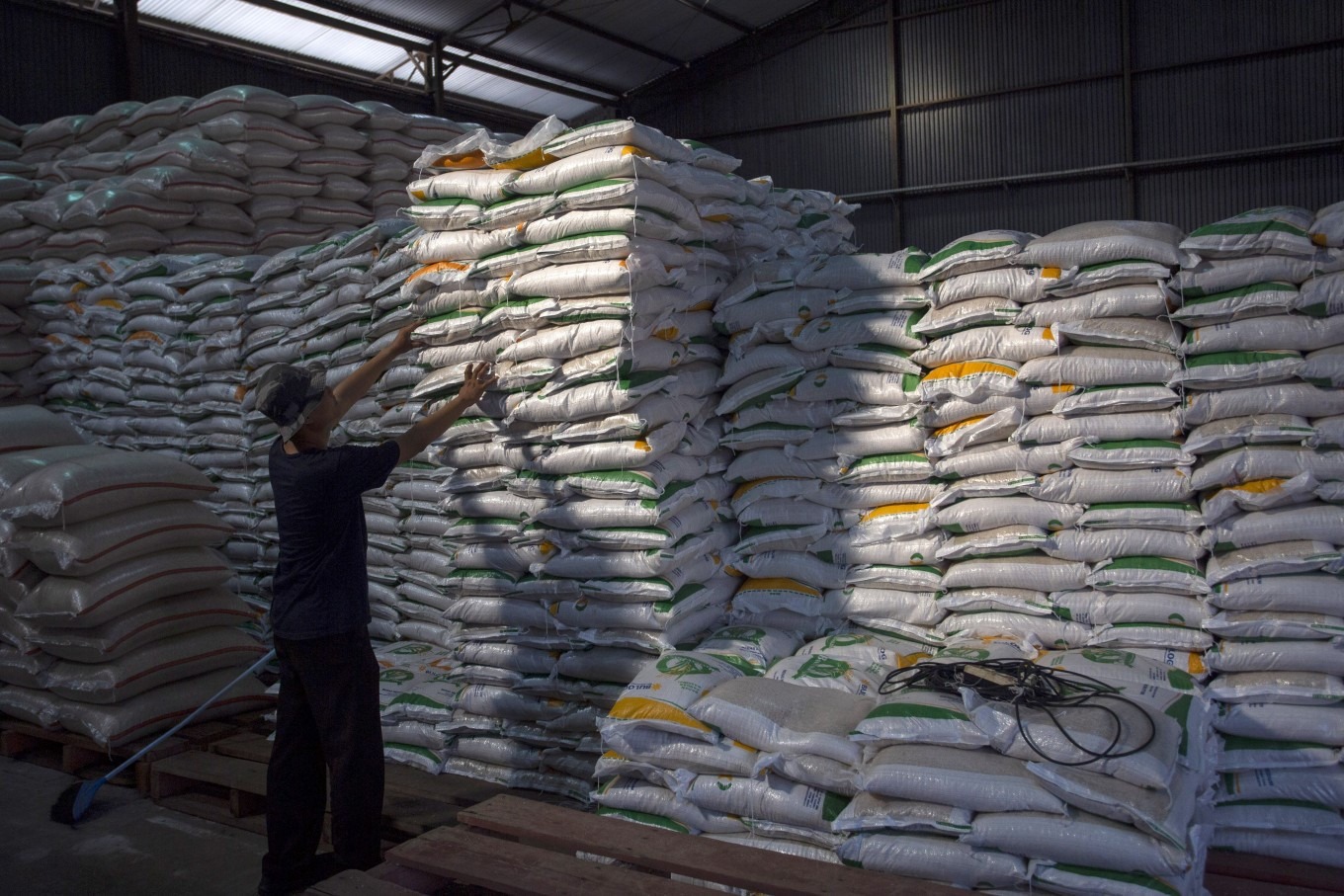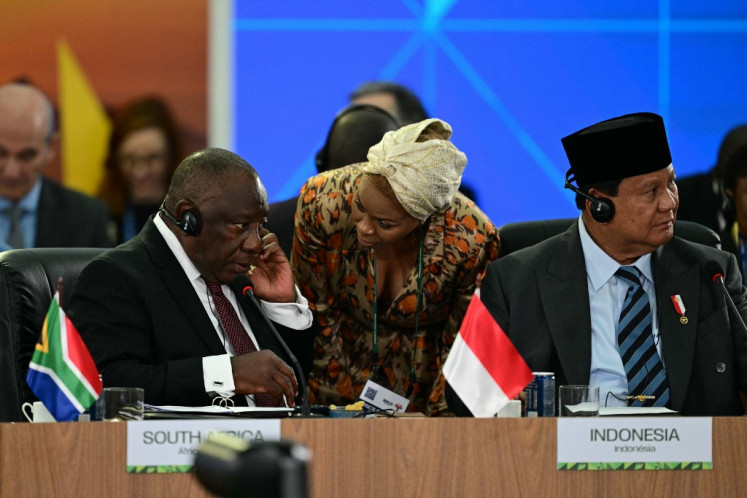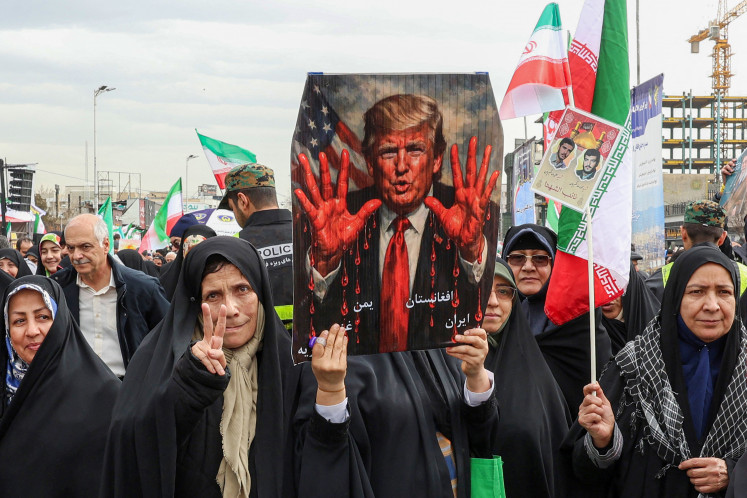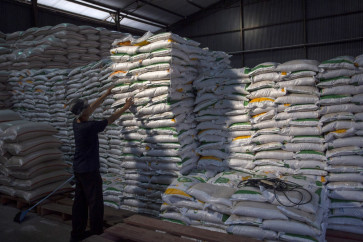Popular Reads
Top Results
Can't find what you're looking for?
View all search resultsPopular Reads
Top Results
Can't find what you're looking for?
View all search resultsAnalysis: Bulog’s new autonomy, a return to the New Order era
Change text size
Gift Premium Articles
to Anyone
 A worker tidies up a stack of locally produced rice at state food company Perum Bulog’s warehouse in Indramayu, West Java, on May 30, 2024. The company said that local rice supply as of early of May had reached 590,000 tonnes, and the production was expected to increase in June. (Antara/Dedhez Anggara)
A worker tidies up a stack of locally produced rice at state food company Perum Bulog’s warehouse in Indramayu, West Java, on May 30, 2024. The company said that local rice supply as of early of May had reached 590,000 tonnes, and the production was expected to increase in June. (Antara/Dedhez Anggara)
T
he State Logistics Agency (Bulog), has been proposed to become an autonomous body directly accountable to President Prabowo Subianto. With this change, Bulog would no longer be under the supervision of the State-Owned Enterprises Ministry, effectively reinstating Bulog’s institutional power back to the New Order era.
President Prabowo’s proposal to make Bulog an autonomous body aims to enhance its operational efficiency. However, by placing Bulog under the President, a potential conflict of interest may arise, as it would act as both regulator and operator, just like it did during the Soeharto era. Allowing Bulog to act as both regulator and operator in food procurement reintroduces a dual role that previously enabled corruption and nepotism, favoring politically connected companies at the expense of broader market transparency. Many corruption cases took place involving Bulog during the New Order era. One of the biggest cases was a corruption scandal in the 1970s, which resulted in a significant loss to the state, amounting to a substantial sum at the time of Rp 7.6 billion (US$18.3 million). Another high-profile case took place in the post-Soeharto era, just before Bulog’s transition. In 2002, former Golkar Party chairman Akbar Tandjung was involved in a corruption case amounting to Rp 40 billion in non-budgetary Bulog funds.
Bulog’s dual role has historically made it a breeding ground for corruption. This systematic failure was a major reason for its 2003 transformation into a state-owned enterprise, relinquishing its authority as an autonomous body. This transformation provided greater supervision of the institution. Placing Bulog under President Prabowo risks reviving corruption, collusion and nepotism, where the President’s appointed officials can manipulate the food market to benefit favored companies. This may lead to higher prices and reduced quality for consumers. Currently, Marga Taufiq, a former aide to President Prabowo who previously served as a special staff member within the Defense Ministry, sits as Bulog’s vice president director. Marga served under President Prabowo during his tenure as Kostrad Commander in 1998, when Marga himself held a position within the Army Strategic Command.
After the 2003 transformation as a state-owned enterprise (SOE), Bulog’s responsibility of fulfilling public service obligations (PSOs) and generating commercial profits has proven to be complex. This balancing act has led to operational difficulties, as evidenced by the Rp 1.7 trillion loss incurred in 2019. Bulog's financial status did, however, steadily improve and has been profitable since 2021. In actuality, Bulog made Rp 820 billion profit in 2023. Moreover, Bulog’s shift as an autonomous body could lead to an overlapping function within existing institutions, particularly the National Food Agency, (Bapanas), which currently serves as both regulator and Bulog’s direct overseer. Bulog does indeed need improvement, however, some believe that the improvement does not require turning it into an autonomous body. With the help of McKinsey & Company, Bulog has just completed its long-term business plan as an SOE, by making a comparative study against similar institutions in Malaysia, the Philippines, China, India and Saudi Arabia. However, its long-term planning is apparently useless now.
State-Owned Enterprises Minister Erick Thohir, whose power is being reduced with the establishment of Danantara Investment Management Agency, has no other choice but to endorse the initiative to reestablish Bulog as an autonomous body. According to Erick, Bulog would require a Rp 26 trillion allocation for its market operations. Following the execution of these operations, the required funding is anticipated to decline by approximately Rp 5 trillion to Rp 6 trillion. Until now, market operations have been facilitated by financial bridging loans from state-owned banks totalling Rp 30 trillion.
What we’ve heard
According to several sources, restructuring Bulog into an autonomous agency under the president is part of Prabowo Subianto's strategy to achieve food self-sufficiency. The President wants all matters related to the food sector, especially those related to supply and price stability, under his direct purview.


















